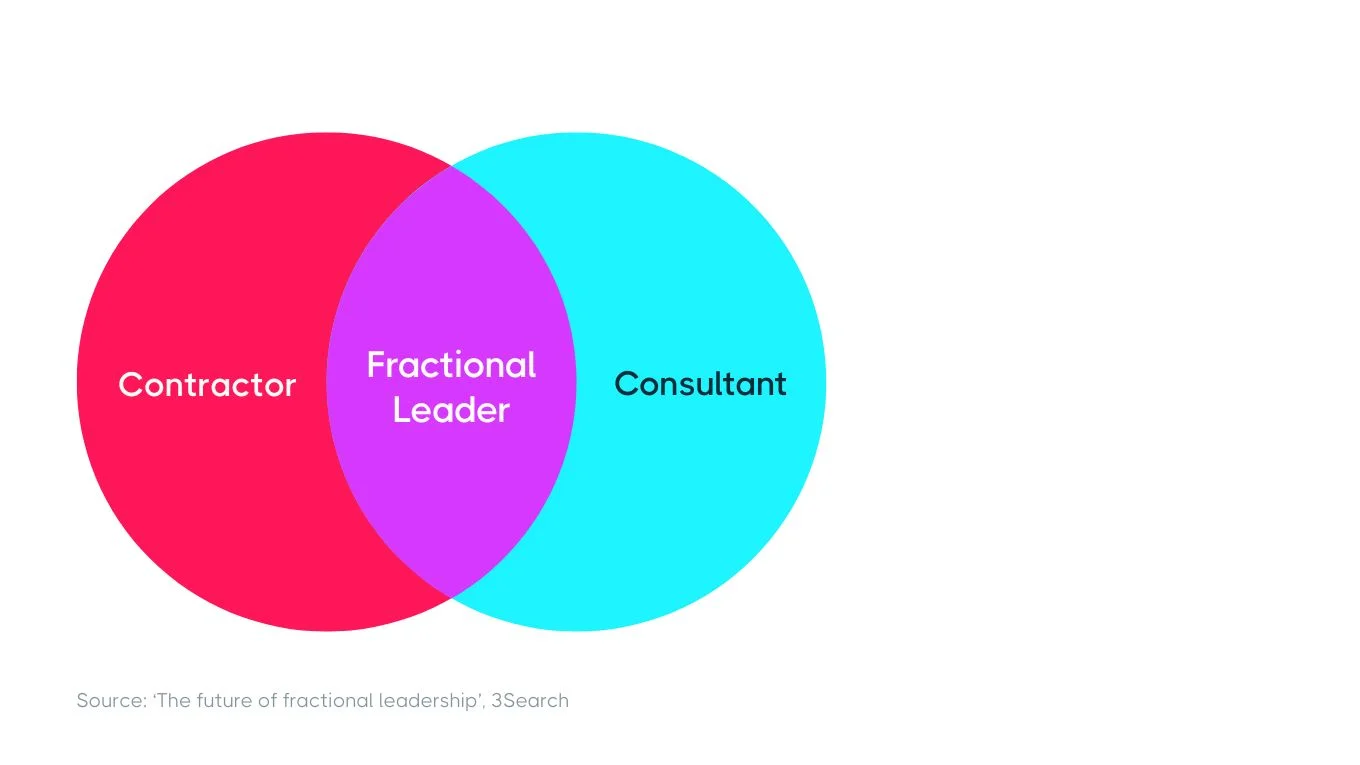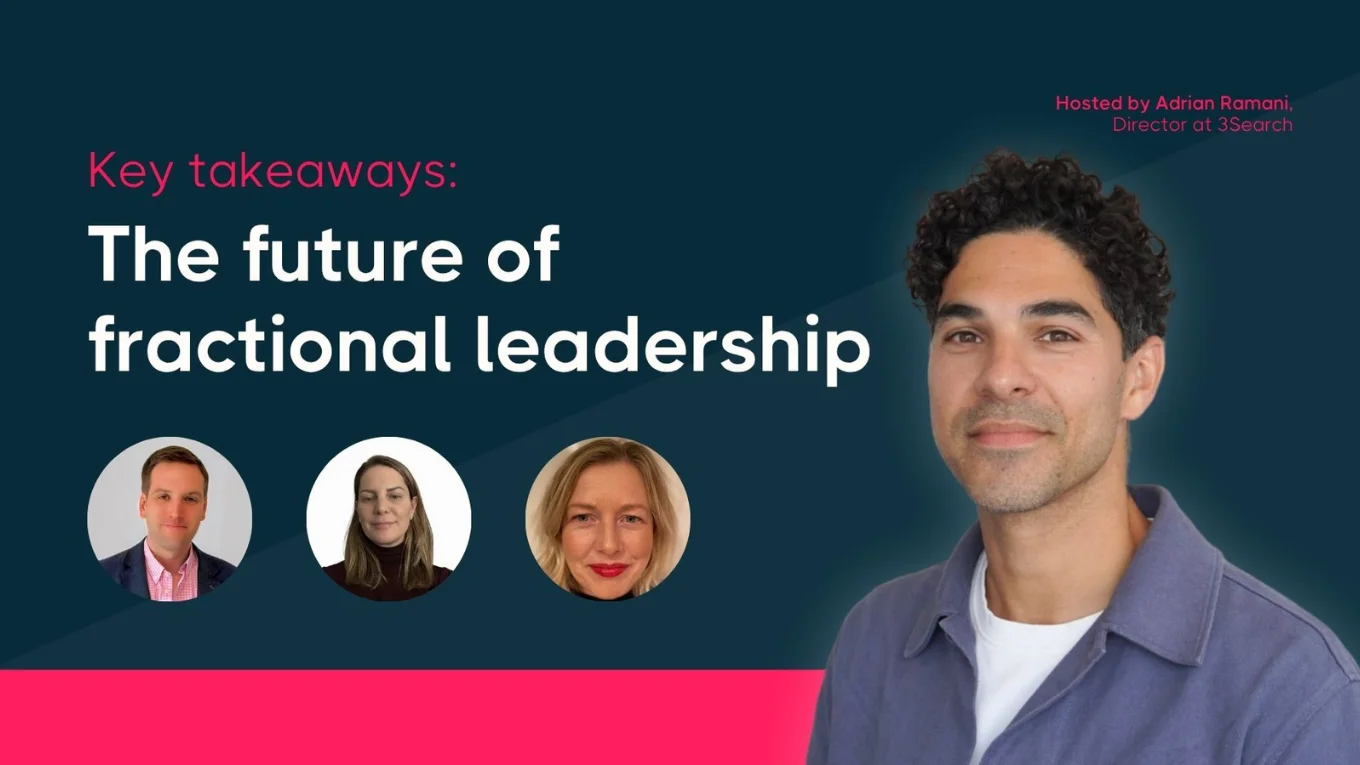Fractional leadership has moved from a niche concept to one of the fastest-growing talent trends in the UK and US. To explore the trend behind this movement, we recently partnered with The Marketing Leaders Network by Havas to host ‘The future of fractional leadership’ event.
Hosted by Adrian Ramani, attendees heard from
- Nick Raymond, Nick has been consulting for the past year across digital transformation and unified commerce, supporting businesses with fractional ecommerce leadership. With over 15 years in senior ecommerce and digital roles, Nick now works with a small team focused on “advise + execute” models, helping brands deliver real, measurable progress.
- Jennifer Stephens, Jennifer is a seasoned business leader with 25+ years of experience scaling companies across ecommerce, omni-channel retail, and frontier technology.
- Maddy Turley, Maddy is a highly commercial and versatile digital leader with experience across omnichannel and pureplay retail, direct to consumer and subscription businesses.
Across an honest, energetic discussion, our speakers shared:
- Their personal journeys as a fractional leader
- The realities of fractional work
- What both leaders and businesses need to know as this model becomes mainstream
Keep reading to learn the key takeaways from their conversation.
Why are companies hiring Fractional Leaders?
Globally, fractional roles are becoming a legitimate part of the senior hiring landscape. What started as a trend in the US, we’re now seeing the UK quickly adopt.
Companies are under more pressure than ever to reduce costs while still producing results. To achieve this, brands need access to senior experience, particularly across ecommerce, digital, performance, product, and marketing. Fractional leadership is now seen as a strategic talent solution, rather than a back-up plan.
Businesses want expertise, but not always five days a week
Many scale-ups and mid-market businesses (typically £10m–£120m turnover) need strategic leadership but don’t require or simply cannot justify a full-time salary.
- Fractional leaders are often the solution, offering:
- Senior expertise at a lower overall cost
- Strategic direction paired with hands-on delivery
- Team leadership without long-term headcount commitments
- A flexible, scalable way to solve problems quickly
Fractional recruitment is truly a cost-effective solution for businesses looking for fresh perspectives on their strategy. As one panellist said, “You can do more in two days than someone junior could do in five.”
The fractional workforce is set to grow dramatically
With more businesses investing in fractional talent, our panellists believe it’s the future of work.
This shift is being driven by:
- Budget-conscious businesses
- Workforce expectations around flexibility
- Increased acceptance of hybrid talent models
- Tech and AI enabling more independent work
- Founders wanting on-demand expertise
Fractional leadership is no longer a trend; it’s becoming a long-term structural change in how companies build teams.
Why are leaders embracing fractional careers?
Every panelist had a different motivation for pursuing Fractional Leadership roles. Here are just some of the reasons why experienced leaders are choosing this path:
- Greater flexibility, especially around family life
- Building a plural career, with the desire to work across multiple brands and sectors
- More control over workload, time and diary
- Financial benefits of operating via a limited company
- Exposure to new markets, tech, and innovation
For many, fractional work offers the perfect mix of autonomy, impact, and variety.
Fractional vs contracting vs consulting
There are three different paths you could take as a senior leader looking to move away from full time roles. Our panellists broke down the differences between fractional, contracting and consulting roles.

Contractor
Contractors are involved with hands-on execution. They're usually implement to fill any team or skill gaps. This could include project-based work or maternity cover, for example.
Consultant
Consultants are far more removed from the business. They usually work on a project-basis, providing recommendations, frameworks, audits, and insight - usually externally.
Fractional Leader
A fractional leader is a hybrid of the two, providing leadership, strategic direction and selective execution. They’re embedded into the business but not full-time.
Fractional leaders are expected to own outcomes, influence senior stakeholders, and make an immediate impact - without being an employee.
How to become a Fractional Leader?
Once you’ve decided that fractional roles are for you, you need to know how to find opportunities. Our panellists shared their insights on how to build a fractional career.
Building your personal brand and network
Your network is one of the best ways to build a fractional career. Visibility creates opportunity. The benefit of investing in your personal brand is that there are lots of ways to approach self-promotion.
For example, some of our panellists favour daily LinkedIn posting, whilst others rely solely on warm referrals from their network. Referrals between fractional leaders are common, too, especially when clients need different specialisms.
To ensure you’re being recommended it’s imperative to stay top of mind. Sharing what you’re working on, posting insights, and keeping relationships warm all play a huge role in building a sustainable pipeline.
Due diligence is one of the most overlooked steps
The panellists were unanimous in that not all clients are created equal.
Key warnings included:
- Always request financials
- Assess the real state of the business, not the one they present
- Trust your instinct - “if it feels off, it is off”
- Understand whether the business is mature enough to utilise a fractional leader
- Protect yourself against late payment or unrealistic expectations
You’re starting a business, not just taking on a project. Build boundaries early and maintain them.
How to price yourself
Despite testing packages, project fees, and sprints, all three panellists ultimately preferred utilising day rates.
Why?
- Simple and transparent
- Easy to manage expectations
- Works well for both short-term and long-term engagements
- Avoids overcommitment or scope creep
- Protects against “emergency founder calls”
Most leaders set a minimum of a half-day, with higher rates for urgent PE work and lower ones for founders or early-stage companies they believe in.
What makes a good Fractional Leader?
Fractional leadership is high-impact, short-cycle work. Businesses want to feel momentum quickly. You need the following skills to be a strong Fractional Leader:
- Rapid diagnosis
- Confident decision-making
- Ability to deliver without full context
- Switching mental models between clients
- Knowing when to hand back to the internal team
- Being comfortable disrupting old processes
Final thoughts
This event showcased exactly why fractional leadership is gaining momentum: it gives businesses access to high-calibre expertise, while giving leaders the freedom, variety, and earning potential they’ve long wanted.
Whether you’re a founder exploring fractional support or a senior leader considering a portfolio career, the message from the panel was clear: There has never been a better time to embrace the fractional model.
A big thank you to our speakers and Havas
We want to extend a huge thank you to our speakers for sharing their time and expertise with us. It was a truly insightful morning.
We’d also like to thank Havas for hosting such a wonderful event. If you’re interested in finding out more about the Marketing Leaders Network by Havas, get in touch with Luke Gordon.
At 3Search, we’re dedicated to supporting the development of your team and career. If you’d like to join us at our next event, keep an eye on our events calendar.




